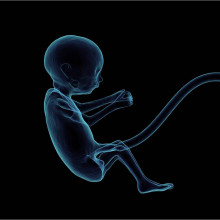How would a foetus develop in zero gravity?
Listener David asked: "Would a foetus develop differently in zero gravity conditions?" Adam Murphy found an answer with the help of reproductive biologist Adam Watkins, from the University of Nottingham...
In this episode

00:00 - QotW - Would a foetus develop differently in zero gravity conditions?
QotW - Would a foetus develop differently in zero gravity conditions?
David - Would a foetus develop differently in zero gravity conditions?
Adam M - Making a whole new human being is a complex process at the best of times, even here on Earth. So what would happen to a fetus, trying to develop in space? Adam Watkins is an expert in reproductive biology from the University of Nottingham, and has some insight into why this is such a tricky question...
Adam W - The difficulty in trying to answer this question is that no one has ever fallen pregnant while being in space. Our best understanding of how zero gravity might affect foetal development comes from studies using animals. Initially, rats and mice were sent into space to see how micro-gravity might affect their ability to reproduce. Unfortunately, the significant disruption of travelling into space meant that none of the females who became pregnant stayed pregnant. Astronauts have also studied how embryos from animals such as mice, salamanders and birds develop under lower gravity. Again, these studies showed that micro gravity had a negative effect on the embryos, slowing down their rate of development so that they contained fewer cells than normal.
Adam M - And although since those initial experiments, some animals like rats have given birth in space, the results have been mixed, and of course, a mouse is a far cry from a person. And fully grown people already have enough trouble when they’re in space.
Adam W - In space, astronauts have to take regular exercise to counteract the negative effects that weightlessness has on bone and muscle strength. On earth, a foetus in the womb also exercises, using the resistance of the amniotic fluid to strengthen its bones and muscles. In space, the lack of gravity could affect the development of a foetuses’ bones, muscles and other organs during pregnancy.
Adam M - All of this leads to NASA having a no pregnancy in space policy, and female astronauts are tested regularly before launch to make sure we don’t end up conducting an impromptu experiment on space pregnancy. And that’s not the end of the potential problems
Adam W - Finally, astronauts are exposed to doses of cosmic radiation 100s of times higher than here on Earth. This high-energy radiation can damage our DNA, causing mutations. During a 9 month pregnancy, both the mother and her developing baby could be exposed to harmful amounts of cosmic radiation, which may have unwanted long-term consequences for things like cancer.
Adam M - So as boredchemist said on the forum: it might be prudent to check that idea with something bigger than a mouse before we risk a human.
Thanks to Adam for delivering that answer, next week, we’re getting our teeth into this one, from James
James - What were the health impacts of the vastly different diets and lifestyles of aristocrats and peasants? Would wealthy Roman patricians be much smarter than plebeians based solely on improved nutrition?










Comments
Add a comment